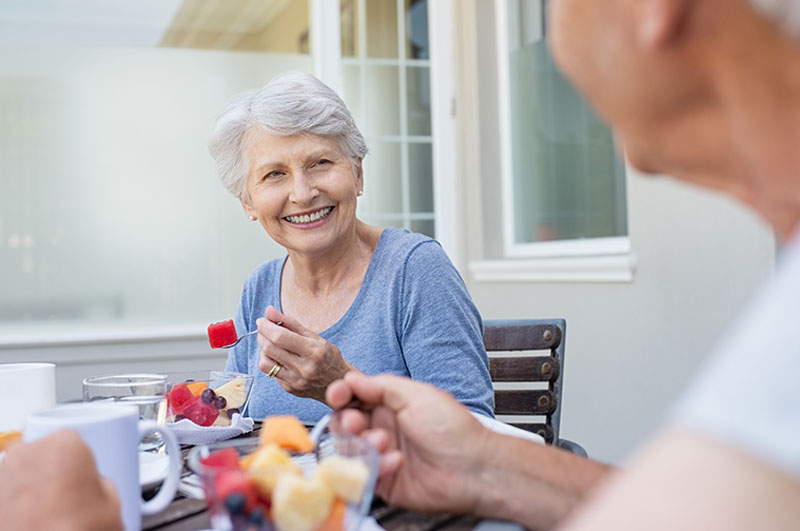
Maintaining a high-fiber diet is important for seniors.
If an older adult you know is more inclined to indulge in the many junk and fast food choices that are so readily available, he or she is in good company. While these foods are convenient, they are frequently high in calories, fat and cholesterol and lack fiber and other key nutrients that are important to nourish aging bodies. In fact, as few as 5% of us are getting enough fiber – something vitally important for older adults.
Why Is a High-Fiber Diet so Important?
Fiber’s health benefits include:
- Weight control: Lower in calories and slower to digest, foods that are high in fiber help us to feel fuller longer.
- Lowered cholesterol: With fiber in the digestive tract, the body absorbs reduced levels of cholesterol.
- Blood sugar consistency: Because high-fiber foods take longer to break down, more consistent blood sugar levels can be maintained.
- Improved digestive tract functioning: Fiber in the digestive tract stimulates the intestines, easing issues from constipation.
- Reduced cancer risk. Sufficient levels of fiber in the diet help protect against certain types of cancer, such as colon cancer.
How to Boost Fiber Intake
If a senior’s diet has been deficient in adequate amounts of fiber, it’s important to incorporate more fiber slowly. Adding too much fiber all at once can cause bloating, gas, and other adverse effects. Encourage seniors to build up fiber intake over several days, while making sure to consume plenty of water as well, which can help reduce unwanted symptoms.
These high-fiber foods are a great place to start. Bear in mind that ideally, adults should be consuming 14 grams of fiber for every 1,000 calories consumed each day, which equates to about 24 grams for women and 38 grams for men.
- Apples (4.4 grams in one raw, medium-sized apple)
- Raspberries (6.5 grams per cup)
- Pears (5.5 grams in one raw, medium-sized pear)
- Strawberries (3 grams per cup)
- Avocado (10 grams per cup)
- Bananas (3.1 grams in one medium-sized banana)
- Carrots (3.6 grams per cup)
- Broccoli (2.4 grams per cup)
- Beets (3.8 grams per cup)
- Brussels sprouts (3.3 grams per cup)
- Artichoke (6.9 grams in one raw globe)
- Kidney beans (12.2 grams per cup, cooked)
- Lentils (13.1 grams per cup, cooked)
- Chickpeas (12.5 grams per cup, cooked)
- Split peas (16.3 grams per cup, cooked)
- Oats (16.5 grams per cup, raw)
- Popcorn (1.15 grams per cup, popped)
- Quinoa (5.2 grams per cup, cooked)
- Almonds (4 grams per 3 tablespoons)
- Sweet potatoes (3.8 grams per medium-sized boiled potato without skin)
- Dark chocolate (3.1 grams per 1-ounce piece)
With a wide variety of options to suit each senior’s particular taste, it’s easy to help older adults eat a high fiber diet to help improve overall health.
At Abby Senior Care, a provider of quality elder care Centennial, CO families need, we understand how a well-balanced diet for older adults helps maintain overall health and wellness so that seniors can continue to live active and engaged lives. Our highly-trained care team is here to help encourage healthy eating and snacking habits for seniors and provide companionship during meals, and any other time, day or night. Our care team can also grocery shop, plan and prepare nutritious meals and snacks that are tailored to specific dietary needs or restrictions, and even clean up the kitchen afterwards.
To learn all about the many ways Abby Senior Care’s award-winning elder care in Centennial can help a senior you love maintain healthy eating habits and so much more, contact us today at 303-699-8840 to schedule a free in-home consultation. For a full list of the areas in which we provide care, please visit our Service Area page.
Abby Senior Care is licensed by the Colorado Department of Public Health and Environment (CDPHE) as a non-medical home care agency (License #04G515).
